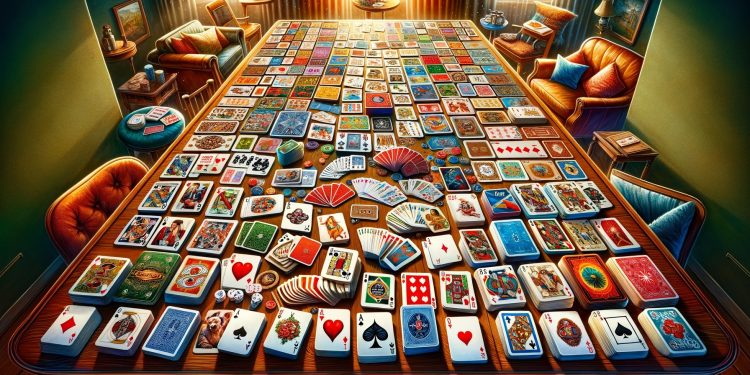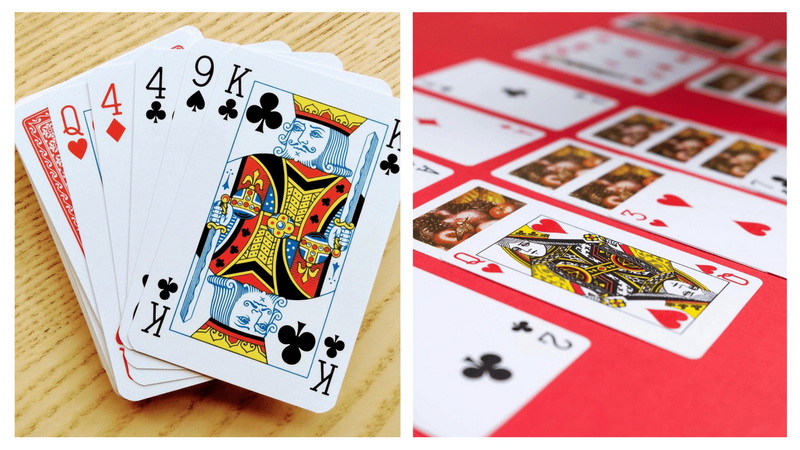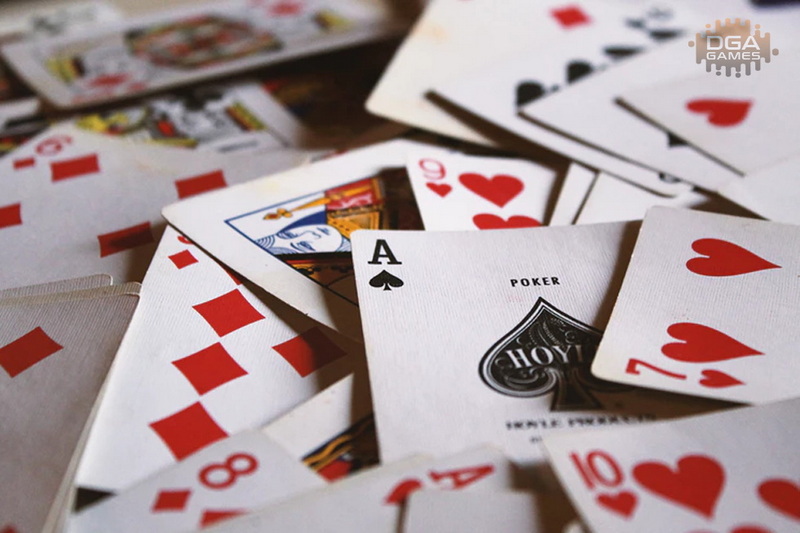Content Menu
● Introduction
● The History of Card Games
>> Evolution of Card Games Over Time
● Most Popular Card Games
>> Classic Card Games
>>> Solitaire
>>> Poker
>>> Bridge
>>> Spades
>>> Hearts
>>> Rummy
>> Modern Card Games
>>> Uno
>>> Exploding Kittens
>>> Codenames
>>> The Mind
>>> Poetry for Neanderthals
● Factors Contributing to the Popularity of Card Games
>> Accessibility
>> Social Interaction
>> Mental Stimulation
>> Portability
>> Variety
>> Nostalgia
● The Impact of Technology on Card Games
>> Online Card Games
>> Digital Card Games
>> Mobile Card Games
● Conclusion
● Frequently Asked Questions
>> 1. What is the most popular card game in the world?
>> 2. What are some good card games for beginners?
>> 3. What are some strategic card games for adults?
>> 4. Are there any card games that can be played solo?
>> 5. What are the benefits of playing card games?
● Citations:
Introduction
Card games have been a source of entertainment and social interaction for centuries. From simple pastimes to complex strategic battles, they offer something for everyone. In this article, we will delve into the world of card games, exploring the most popular options, their historical significance, and why they continue to captivate players of all ages. Whether you are a seasoned card shark or a novice looking to learn a new game, this guide will provide valuable insights into the diverse and fascinating realm of card games.

The History of Card Games
The origins of card games can be traced back to 9th-century China during the Tang Dynasty[3]. These early cards were likely derived from paper currency and used as both gaming tools and currency substitutes. By the 14th century, card games had made their way to Europe, quickly gaining popularity among the aristocracy and general populace alike.
The earliest European cards were hand-painted, making them luxury items affordable only to the wealthy. However, with the invention of the printing press, the mass production of cards became possible, leading to their widespread availability and adoption across different social classes.
Evolution of Card Games Over Time
Over the centuries, card games have evolved and diversified, with new games emerging and old ones adapting to changing tastes and cultural norms. The standard 52-card deck, with its four suits (hearts, diamonds, clubs, and spades), became the foundation for countless games, each with its unique rules and strategies.
During the 16th and 17th centuries, card games such as Primero (a precursor to poker) and Basset gained prominence in European gambling houses. These games were often associated with high stakes and were popular among the nobility and wealthy merchants.
In the 19th century, card games experienced a surge in popularity in the United States, particularly during the westward expansion and the Gold Rush era. Poker, in particular, became a staple of saloons and gambling dens, evolving into the game we know today.
Most Popular Card Games
Identifying the "most popular" card game is not a straightforward task, as popularity can vary depending on geographical location, age group, and personal preferences[5]. However, some card games have consistently ranked high in terms of player participation, sales, and cultural impact.
Classic Card Games
Classic card games are those that have stood the test of time, maintaining their popularity over generations. These games are often characterized by simple rules, accessibility, and the ability to accommodate a wide range of players.
Solitaire
Solitaire, also known as Patience, is arguably the most popular single-player card game in the world[3][8]. Its origins can be traced back to the late 18th century, and it gained widespread popularity in the 19th century. The game involves arranging cards in a specific order, typically by suit and rank, with the goal of moving all cards to the foundation piles.
Solitaire's appeal lies in its simplicity and accessibility. It can be played anywhere, anytime, with just a standard deck of cards. Moreover, the game offers a sense of accomplishment as players solve the puzzle and complete the layout. Its digital versions have further propelled its popularity, with numerous apps and online platforms offering various solitaire variations[9].
Poker
Poker is a family of card games that combine strategy, skill, and chance. It is one of the most iconic and widely recognized card games in the world, with numerous variations and a thriving professional circuit[5][7]. The origins of poker are debated, but it is believed to have evolved from various European and Persian card games.
The basic premise of poker involves players wagering on the strength of their hands, with the goal of winning the pot (the accumulated bets). Different poker variations have different rules regarding hand rankings, betting structures, and the number of cards dealt. Some of the most popular poker variations include Texas Hold'em, Omaha, and Seven-Card Stud.
Poker's appeal lies in its blend of skill and luck. While chance plays a role in the cards dealt, skilled players can use strategy, bluffing, and reading opponents to gain an edge. The game has also become a cultural phenomenon, with poker tournaments attracting large audiences and lucrative prizes.
Bridge
Bridge is a trick-taking card game played by four players in two competing partnerships[5]. It is considered one of the most intellectually stimulating card games, requiring strategy, communication, and teamwork. Bridge is particularly popular in Western countries and is often played in clubs and tournaments.
The game involves bidding, where players estimate the number of tricks their partnership can win, and then playing tricks to fulfill the contract. Bridge requires a deep understanding of card combinations, probabilities, and partner signaling. It is a challenging game that rewards skill and experience.
Spades
Spades is a trick-taking card game that is typically played by four players in two partnerships[2][3]. It is popular in the United States and other parts of the world. Spades is similar to other trick-taking games like bridge and hearts, but with a unique bidding system and the trump suit always being spades.
The game involves players bidding on the number of tricks they believe they can win, and then attempting to fulfill their bid. Spades requires strategy, teamwork, and an understanding of card values and probabilities. It is a fast-paced and exciting game that can be enjoyed by players of all skill levels[9].
Hearts
Hearts is a trick-taking card game where the aim is to avoid taking tricks containing hearts or the queen of spades[5][7]. It is typically played by four players and is popular for its simple rules and engaging gameplay. Hearts requires players to think strategically about which cards to play and how to avoid collecting penalty points.
The game involves players passing cards to each other at the beginning of each round, adding an element of strategy and anticipation. Hearts is a fun and social game that can be enjoyed by families and friends.
Rummy
Rummy is a family of card games that involve matching cards of the same rank or sequence and same suit[5][7]. There are many variations of rummy, including Gin Rummy, Canasta, and Rummy 500. Rummy is popular worldwide and is known for its simple rules and engaging gameplay.
The game involves players drawing and discarding cards to create melds (sets or runs) and reduce the value of unmatched cards in their hand. Rummy requires strategy, memory, and an understanding of card combinations. It is a versatile game that can be adapted to different player preferences and skill levels.
Modern Card Games
Modern card games are those that have emerged in recent years, often incorporating innovative mechanics, themes, and artwork[5]. These games cater to a wide range of interests and preferences, offering unique and engaging experiences.
Uno
Uno is a shedding-type card game where players aim to be the first to get rid of all their cards by matching the color, number, or symbol of the previous card played[1]. It is known for its simple rules, fast-paced gameplay, and ability to accommodate multiple players.
Uno has become a global phenomenon, with numerous editions and variations catering to different audiences. Its appeal lies in its accessibility and the element of surprise, as players can use action cards to disrupt their opponents and change the course of the game. According to Mattel, almost one Uno deck was sold every second in the US last year[1].
Exploding Kittens
Exploding Kittens is a strategic card game where players draw cards until someone draws an Exploding Kitten card, at which point they are eliminated from the game unless they have a Defuse card[4][5]. It is known for its quirky artwork, humorous themes, and unpredictable gameplay.
Exploding Kittens has gained a large following due to its unique blend of strategy and luck. The game requires players to anticipate their opponents' moves, manage their risks, and use special cards to avoid drawing the dreaded Exploding Kitten. It is a fun and engaging game that can be enjoyed by players of all ages.
Codenames
Codenames is a social word game where two teams compete to identify their secret agents based on one-word clues given by their spymasters[5]. It is known for its clever wordplay, strategic thinking, and ability to foster teamwork and communication.
Codenames has become a popular party game due to its simple rules and engaging gameplay. The game requires players to think creatively, make connections between words, and decipher their spymaster's clues. It is a fun and social game that can be enjoyed by large groups.
The Mind
The Mind is a cooperative card game where players must work together to play cards in ascending order without communicating with each other[4]. It is known for its unique gameplay, challenging difficulty, and ability to foster teamwork and non-verbal communication.
The Mind requires players to develop a sense of timing and intuition as they try to anticipate when to play their cards. It is a challenging but rewarding game that can be enjoyed by small groups.
Poetry for Neanderthals
From the makers of Exploding Kittens, this hilariously goofy, fast-paced thinker game will win the night: Poetry for Neanderthals[4]. The competitive word-game gives you clues that you must then speak out in single-syllable words. If you're given the clue “asparagus,” you could say something like, “Green food for good health make pee smell weird” to encourage your teammates to guess the awkward veggie. If you mess up, though, by saying “veggie”, you get bopped with the NO! Stick and lose a point.
Using the 220 double-sided cards, sand timer, and point slates, you and your teammates must get through as many words as possible with 90 seconds on the clock. Just remember,... Poetry for Neanderthals never uses big words. Players must match cards of the same suit to form sequences and win the game. Rush through the rounds but engage that brain or you'll get bopped and go away grumpy.

Factors Contributing to the Popularity of Card Games
The enduring appeal of card games can be attributed to a variety of factors:
Accessibility
Card games are generally easy to learn and play, making them accessible to people of all ages and skill levels. Many card games have simple rules that can be quickly grasped, allowing players to start enjoying the game right away.
Social Interaction
Card games provide a platform for social interaction and bonding. Whether played with family, friends, or strangers, card games encourage communication, teamwork, and friendly competition.
Mental Stimulation
Card games can provide mental stimulation and exercise cognitive skills such as memory, strategy, and problem-solving. Many card games require players to think critically, anticipate their opponents' moves, and make strategic decisions.
Portability
Card games are highly portable, making them ideal for travel, vacations, and social gatherings. A deck of cards can be easily carried in a pocket or bag, allowing players to enjoy a game anytime, anywhere.
Variety
The vast variety of card games available ensures that there is something for everyone. From classic games to modern innovations, card games cater to a wide range of interests, preferences, and skill levels.
Nostalgia
Card games often evoke feelings of nostalgia and fond memories. Many people have grown up playing card games with their family and friends, creating a sense of tradition and connection.
The Impact of Technology on Card Games
Technology has had a significant impact on the world of card games, transforming the way they are played and accessed.
Online Card Games
Online card games have become increasingly popular, allowing players to compete with others from around the world. Numerous websites and apps offer a wide variety of card games, including poker, bridge, rummy, and solitaire.
Online card games provide convenience, accessibility, and a wide range of opponents. They also offer features such as tutorials, statistics tracking, and social networking, enhancing the overall gaming experience.
Digital Card Games
Digital card games, such as Hearthstone and Magic: The Gathering Arena, have gained a large following in recent years. These games combine the strategic depth of traditional card games with the visual appeal and interactivity of video games.
Digital card games offer a unique and engaging experience, with stunning graphics, immersive sound effects, and innovative gameplay mechanics. They also provide a platform for competitive play, with tournaments and leagues attracting skilled players from around the world.
Mobile Card Games
Mobile card games have made card games even more accessible, allowing players to enjoy their favorite games on smartphones and tablets. Numerous mobile apps offer a wide variety of card games, from classic solitaire to modern strategy games.
Mobile card games provide convenience, portability, and a wide range of options. They also offer features such as offline play, social integration, and customizable settings, enhancing the overall gaming experience.
Conclusion
Card games have been a beloved form of entertainment for centuries, offering a diverse range of options to suit every taste and preference. From classic games like poker and solitaire to modern innovations like Exploding Kittens and Codenames, card games continue to captivate players of all ages. Their enduring appeal can be attributed to their accessibility, social interaction, mental stimulation, and portability.
Technology has further enhanced the world of card games, with online, digital, and mobile platforms providing new ways to play and connect with others. Whether you are a seasoned card player or a novice looking to learn a new game, the world of card games offers endless opportunities for fun, challenge, and social interaction.

Frequently Asked Questions
1. What is the most popular card game in the world?
Determining the single most popular card game is difficult due to varying regional preferences and evolving trends. However, Solitaire, Poker, Uno and Spades consistently rank high in terms of global popularity[1][3][8].
2. What are some good card games for beginners?
For beginners, easy-to-learn games like Go Fish, Crazy Eights, and Uno are excellent choices[1][3]. These games have simple rules and provide a fun introduction to card game mechanics.
3. What are some strategic card games for adults?
Strategic card games that require critical thinking and planning include Bridge, Poker, and Rummy[5][7]. These games offer complex gameplay and reward skillful decision-making.
4. Are there any card games that can be played solo?
Yes, Solitaire is the most well-known card game for a single player[3][8][9]. It offers a relaxing and mentally stimulating experience.
5. What are the benefits of playing card games?
Playing card games can improve cognitive skills, enhance social interaction, reduce stress, and provide entertainment[3][5]. They offer a fun and engaging way to exercise the mind and connect with others.
Citations:
[1] https://www.cnn.com/2024/06/03/business/uno-card-game-popularity-cec/index.html
[2] https://blog.spilsbury.com/most-popular-card-games/
[3] https://today.yougov.com/entertainment/articles/45795-how-americans-feel-about-30-card-games
[4] https://theboardgamecollection.com/top-10-most-popular-card-games/
[5] https://joyful-games.com/blogs/card-and-board-games-101/the-most-popular-card-games-modern-and-classic-2023-2024
[6] https://steamdb.info/charts/?tagid=1666
[7] https://vipspades.com/blog/most-popular-card-games-in-the-world/
[8] https://www.statista.com/statistics/1490464/most-popular-card-games-us/
[9] https://www.mobilityware.com/top-10-most-popular-card-games-of-2021/
































